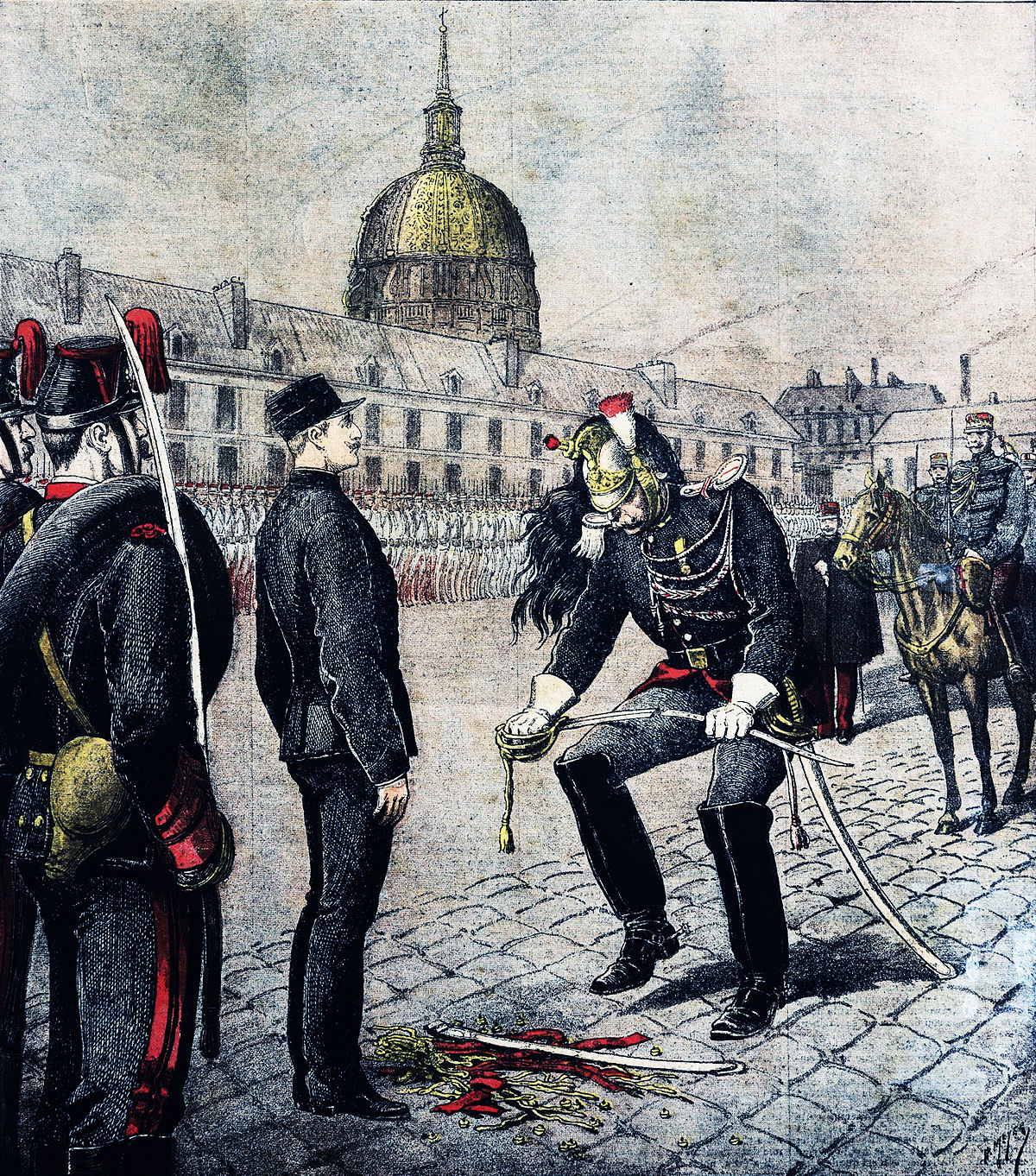"The traitor: Degradation of Alfred Dreyfus, degradation in the Morland Court of the military school in Paris"
The Dreyfus affair (French: affaire Dreyfus) was a political scandal that divided the Third French Republic from 1894 until its resolution in 1906. The scandal began in December 1894 when Captain Alfred Dreyfus, a 35-year-old Alsatian French artillery officer of Jewish descent, was wrongfully convicted of treason for communicating French military secrets to the German Embassy in Paris. He was sentenced to life imprisonment and sent overseas to the penal colony on Devil's Island in French Guiana, where he spent the following five years imprisoned in very harsh conditions.
In 1896, evidence came to light—primarily through the investigations of Lieutenant Colonel Georges Picquart, head of counter-espionage—which identified the real culprit as a French Army Major named Ferdinand Walsin Esterhazy. High-ranking military officials suppressed the new evidence, and a military court unanimously acquitted Esterhazy after a trial lasting only two days. The Army laid additional charges against Dreyfus, based on forged documents. Subsequently, writer Émile Zola's open letter J'Accuse...! in the newspaper L'Aurore stoked a growing movement of political support for Dreyfus, putting pressure on the government to reopen the case.
In 1899, Dreyfus was returned to France for another trial. The intense political and judicial scandal that ensued divided French society between those who supported Dreyfus, the "Dreyfusards" such as Sarah Bernhardt, Anatole France, Charles Péguy, Henri Poincaré and Georges Clemenceau; and those who condemned him, the "anti-Dreyfusards" such as Édouard Drumont, the director and publisher of the antisemitic newspaper La Libre Parole. The new trial resulted in another conviction and a 10-year sentence, but Dreyfus was pardoned and released. In 1906, Dreyfus was exonerated. After being reinstated as a major in the French Army, he served during the whole of World War I, ending his service with the rank of lieutenant colonel. He died in 1935.
The Dreyfus affair came to symbolise modern injustice in the Francophone world; it remains one of the most notable examples of a miscarriage of justice and of antisemitism. The affair divided France into pro-republican, anticlerical Dreyfusards and pro-Army, mostly Catholic anti-Dreyfusards, embittering French politics and encouraging radicalisation. The press played a crucial role in exposing information and in shaping and expressing public opinion on both sides of the conflict.
Hexbear links
- 🐻Link to all Hexbear comms
- 📀 Come listen to music and Watch movies with your fellow Hexbears nerd, in Cy.tube
- 🔥 Read and talk about a current topics in the News Megathread
- ⚔ Come talk in the New Weekly PoC thread
- ✨ Talk with fellow Trans comrades in the New Weekly Trans thread
- 👊 Share your gains and goals with your comrades in the New Weekly Improvement thread
- 🧡 Disabled comm megathread
reminders:
- 💚 You nerds can join specific comms to see posts about all sorts of topics
- 💙 Hexbear’s algorithm prioritizes comments over upbears
- 💜 Sorting by new you nerd
- 🌈 If you ever want to make your own megathread, you can reserve a spot here nerd
- 🐶 Join the unofficial Hexbear-adjacent Mastodon instance toots.matapacos.dog
Links To Resources (Aid and Theory):
Aid:
Theory:


(Source.)